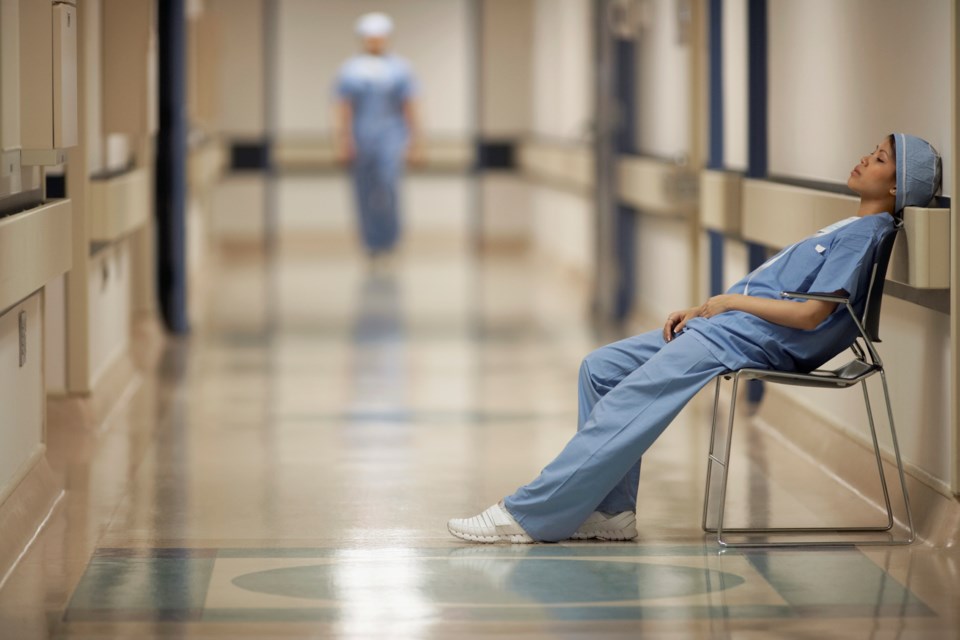As the pandemic and family doctor shortage overwhelms the province, many doctors and nurses in rural emergency departments (ED) are unable to keep their doors open.
Since the beginning of 2022, B.C. has seen consistent closures of rural hospital EDs as a result of staffing shortages or the inability to cover someone’s shift due to illness. Communities that have faced the most closures include Clearwater, Chetwynd, Mackenzie and Port McNeill.
When an ED closes its doors or announces it has been placed on diversion, the ripple effect is felt across multiple communities.
“There's a growing frustration in Clearwater, Ashcroft and Lillooet around these closures because there just does not seem, over the last five years, like there was any urgency given to try and address the situation that's been growing,” said Peter Milobar, Kamloops-North Thompson MLA.
In Clearwater, the most closures have been recorded with roughly 28 since the beginning of the year. Patients from this hospital are most commonly diverted to the Royal Inland Hospital (RIH) in Kamloops. Though (RIH) has not seen an ED closure as of yet, according to Milobar they are extremely short staffed and feeling the pressure.
“It puts nurses in a very compromised position on the one hand, knowing that they're not living up to the standard of care that they're supposed to based on their professional ethics but on the other hand, knowing that just phoning in and not coming into their shift makes it even worse,” he said.
Hospital and ambulance wait times have been increasing across the province in conjunction with a growing number of ED closures. Despite the lack of closures in cities like Vancouver, there are significant issues with wait times and under-staffing. saw a patient pass away on a stretcher in the ED waiting room. At the heart of the issue is under-staffing and recruitment.
Clearwater Mayor Merlin Blackwell says that the situation at Dr. Helmcken Memorial Hospital has been exasperated by the Trans Mountain pipeline. Workers who come from other provinces like Alberta have been overwhelming the emergency room, he tells Glacier Media.
He says they use the emergency room like a walk-in clinic.
“When you're working on a team of eight to 12 nurses, you lose one person and all of a sudden the schedule starts to go wonky,” Blackwell said.
He added that the closures are felt intensely within the community due to residents' pride in their hospital. They feel as though they really own it after Clearwater fought to have it built, he says.
Issues persist up north
Northern Health has not been spared. Communities like Chetwynd and Mackenzie struggle to keep their EDs fully functional.
“It's a huge issue and a huge concern for a community like Chetwynd where they have their small hospital but they're also such an important hospital being right on the edge of such a major thoroughfare,” said MLA Mike Bernier, who serves the Peace River South area.
He says that he speaks often with nurses and doctors that are working double and triple shifts in order to keep their EDs open.
“I met with a doctor yesterday that told me in the last seven months, he has not had more than eight consecutive hours off,” he said.
Glacier Media has reached out to physicians but many are worried about the consequences of speaking out against the health system. According to Bernier, they are concerned about the “political backlash” they may face.
There are no easy solutions
On Vancouver Island, Mayor Gaby Wickstrom of Port McNeill is working alongside Island Health in order to reassure residents that solutions are coming.
According to Wickstrom, Island Health held an online forum for community members to ask questions and understand what is being done in order to keep their ED up and running.
“There was a candidness in those conversations. When I heard some of the upper management say, you know, we want to overhire, we want to be in a position where we're not scrambling at the last minute. You know, you got to see their faces and you got to see that nobody wants this,” she said.
However, in other parts of the province, there are increased feelings of frustration with both the health authorities and provincial government.
MLA Bernier says the government needs to work to create more training positions to get doctors and nurses into the system. If not, they are simply pulling much-needed resources from other hospitals, he says.
“So all we've done is move the problem around to the province rather than fixing the problem.”
“I'm not gonna say it's easy, but if they [the NDP] want to be in government and they want to be the decision makers, then they need to make some damn decisions and fix this problem,” Bernier said.
According to the Ministry of Health, they have opened up “several avenues” to increase the number of nurses and physicians both trained here in B.C. and in other provinces or countries.
“This is not something that we will be able to fix overnight, but it is something that we are working on as efficiently and effectively as possible,” the Ministry said in a statement to Glacier Media.



